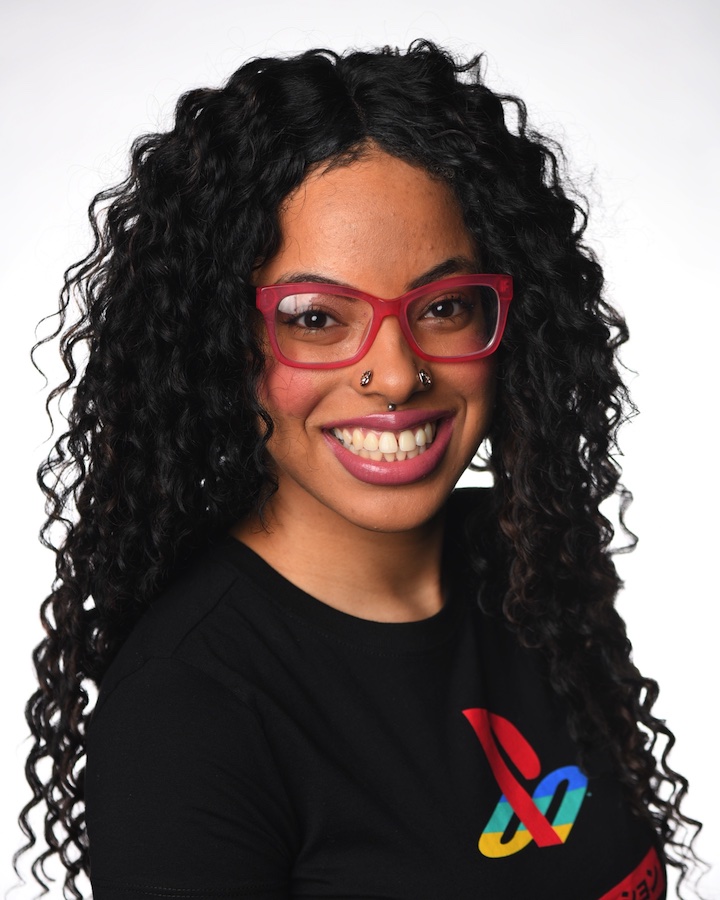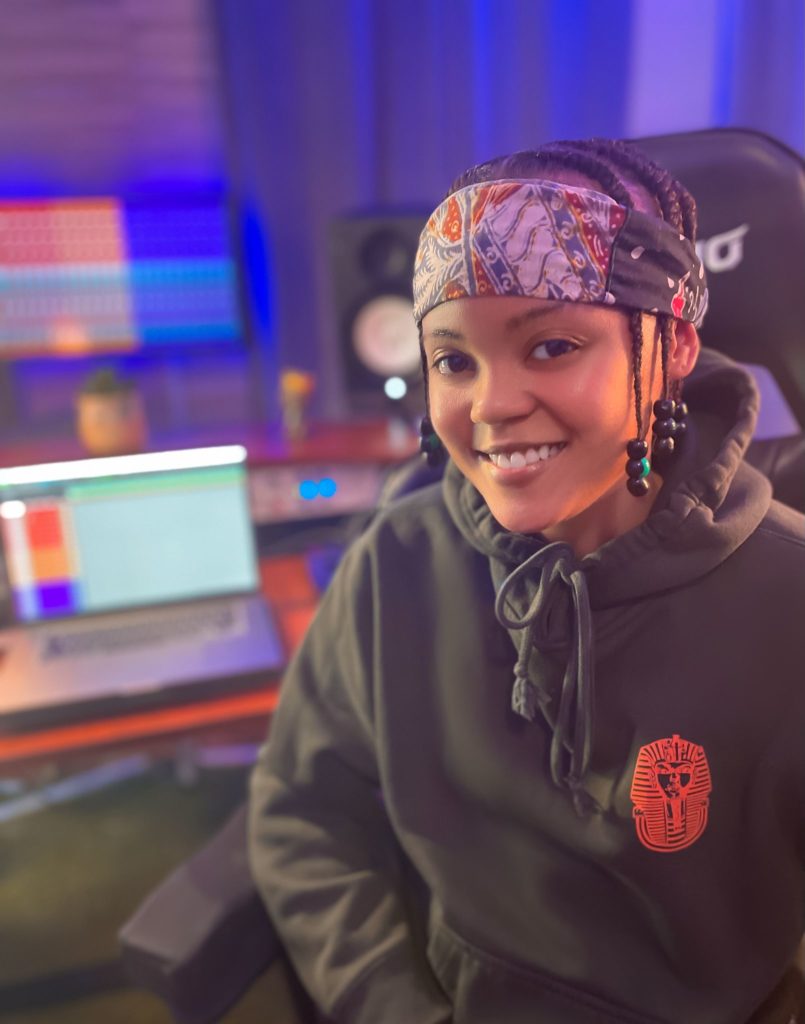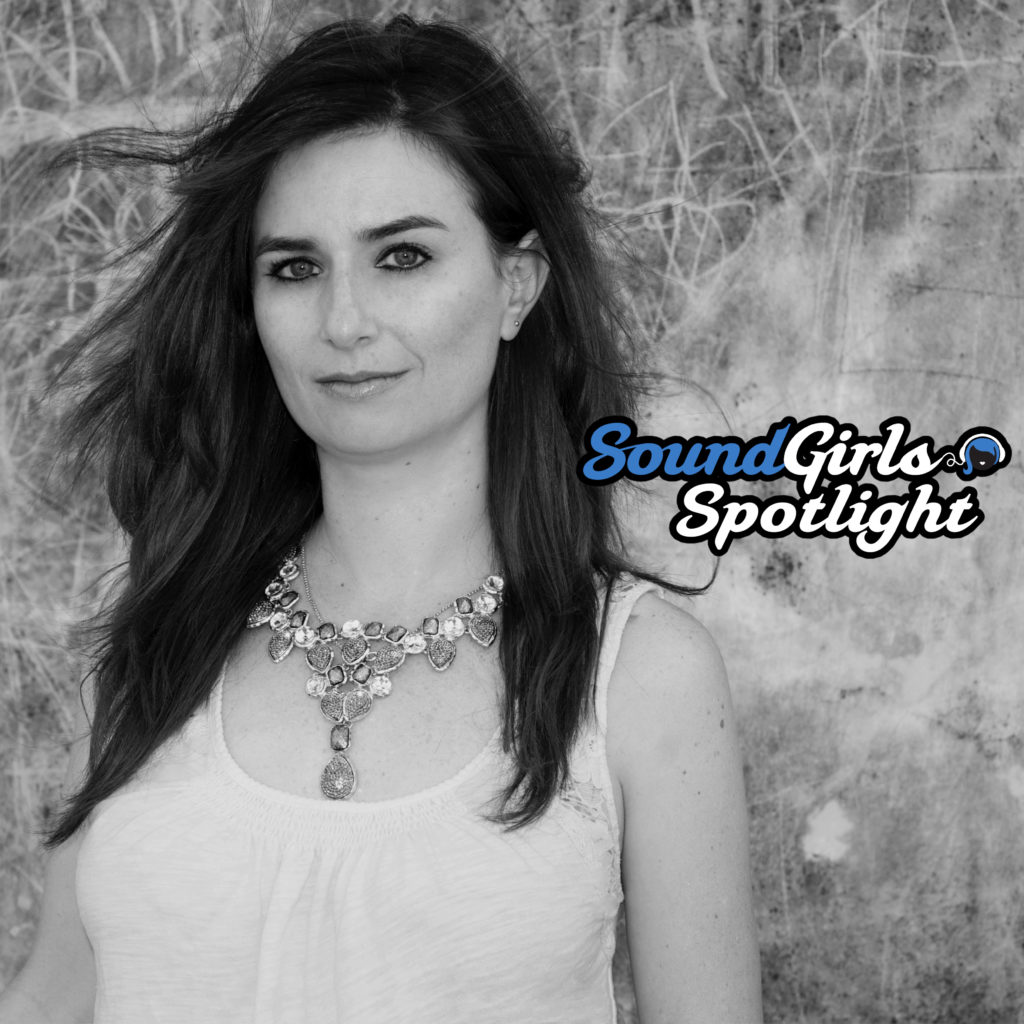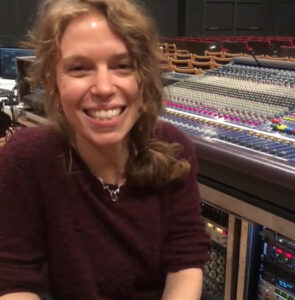 Bryony October is an independent live sound engineer who started touring when she 15. She has toured as a merch-seller, catering assistant, and backline tech before moving into live sound. She has been working in live sound for the last 20 years.
Bryony October is an independent live sound engineer who started touring when she 15. She has toured as a merch-seller, catering assistant, and backline tech before moving into live sound. She has been working in live sound for the last 20 years.
She got her foot in the touring world, by writing to her favorite band, The Levellers, and asked if she could do her work experience placement at their fan club. Bryony explains that this “was before the days of the internet/Facebook social media etc. so fan clubs were how bands and fans interacted. You would join your favourite band’s fan club, and they would send you special releases, a fanzine, and you could buy t-shirts from them directly.” The only problem was she did not post the letter, believing that The Levellers would think the proposition was ridiculous. Luckily for Bryony, her mother posted the letter, and to Bryony’s surprise, they wrote back and invited her to their recording studio in Brighton. Her Aunt and Uncle happened to live in Brighton, and she packed up her bags to spend the week mailing t-shirts and fanzines and making photocopies of the newsletter. The Levellers would invite Byrony back during the summer holiday at which time they brought her on tour for a few days. Bryony at the age 15, got a taste for what life on a tour bus was like, and was hooked. She would set her sights on tour managing, as she did not have technical skills.
From their Bryony, who always took an interest in music, took a module in music technology as A’level music (A’levels are the exams you take that get you into University when you’re 17/18.) This was the late 90’s, and Music technology was a very new thing to be taught at Universities. Bryony remembers that “there was not Pro Tools yet-we used Cubase, and it was the first year the UK had ever run such a module as part of a formal music qualification. Suffice to say I was the only girl in the course. Unfortunately, the teacher left after the first year as the course was in its infancy and not very structured or easy to teach, so it didn’t work out for me, and that knocked my technical confidence.”
She studied Philosophy & Critical Theory with Film/Television making and she joined the Student Union technical crew. This was when Bryony realized she had an aptitude for audio technology. “I think once I was in the live context that I was used to being around with the Levellers’ tours that the technical side of things began to make sense. The University Student’s Union had once been a gig on the old university touring circuit and had a Turbosound Floodlight Pa system, and Soundcraft analog consoles at both ends of the multi as well as a great selection of Shure mics. Unfortunately, the club scene had taken over as student’s preferred night out, so we didn’t get many bands through anymore, but I worked many an hour in the union with two channels of DJ which gave me a lot of facetime with the console just fiddling around. As soon as I told the Levellers’ FOH engineer that I knew the rudiments of how a Soundcraft console worked, he got me mixing any support act that came through on the Levellers’ tours. From there, I started to make contacts with all these young up-and-coming support acts who asked me back to mix and tour manage their smaller level tours.”
She also continued to tour The Levellers as a merch assistant. On the first day of the tour “ the main merch guy told me I needed to get up at 9 am to watch the merch boxes get loaded in and sit with them all day until he came in at 3 pm to make sure no one stole any t-shirts. There was no way I was going to just sit there with the hive of activity around me, so I asked the Levellers’ FOH engineer if I could help with the PA. My musical background pulled me more towards an interest in sound more than lighting, and I didn’t like the look of all the ladders and climbing in the lighting department!”
Bryony toured with the Levellers as backline tech/pa tech mixing any support acts that came through without an engineer until 2002 and then moved into just mixing foh with a bit of TM-Ing with smaller acts which she had met when mixing the support acts on the Levellers’ tours. Bryony says they were”the band’s no one would have heard of like Clearlake, the Crocketts, Captain and then a band that supported Clearlake called Delays started to take off and employed me just as foh.” Delays would take her on an international tour and helped to build Bryony’s reputation as a FOH engineer. She then went on to work the Noisettes a female-fronted pop act in the UK and then with Foxes another female-fronted UK pop act. Bryony has also worked with the acclaimed singer-songwriter Laura Marling, legendary 80s singer Billy Ocean, and her main artist Katie Melua whom she also does some production advances for. She is also the FOH/TM for Ward Thomas.
For the love of analog
I started mixing a few years before the advent of digital consoles, but by the time I had got to a level where I was touring my console, it was all digital. I always promised myself that when the right tour came up, I would take an analog desk and racks of lovely old outboard, but it didn’t happen until 2018. The tour was Katie Melua with the Gori Women’s choir. I have never been so excited or so proud to have been a part of such a tour and take out that package of gear. It was a brave and bold move as it simply isn’t the done thing anymore. Many venues don’t have space at FOH anymore, and local crews are not used to handling such a large and heavy console. It is also a completely different mixing experience, and some people would say much more limited, which it is in a way. I see it as ‘real mixing’ because there are no snapshots or recall and you have to really listen to what you are doing instead of pulling out frequencies on a visual display. I had the BEST time, and we had nothing but positive reviews and endless streams of people complimenting the sound both to me at foh, in social media feedback to Katie and the show reviews. Legendary producer William Orbit came to 2 of the shows and told Katie that it was in the top 10 sonic experiences of his life!
Live Sound Challenges
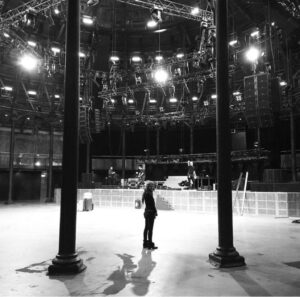 Probably one of the most challenging and yet rewarding experiences came about because of the familiar story of lack of time and money going into an extremely high-pressure situation. I’ve worked with the singer Foxes since 2012, and she got booked for the Coldplay US stadium tour as support with about three weeks’ notice back in 2016. The budget was extremely tight, and our monitor engineer wasn’t available for the tour. We had been touring Soundcraft consoles all year and were not set up in any way for the Digico SD7s that would present themselves for this tour. We only had one day’s rehearsal so it made (time and budgetary) sense that I should set up the band’s in-ears at the same time of building my FOH mix.
Probably one of the most challenging and yet rewarding experiences came about because of the familiar story of lack of time and money going into an extremely high-pressure situation. I’ve worked with the singer Foxes since 2012, and she got booked for the Coldplay US stadium tour as support with about three weeks’ notice back in 2016. The budget was extremely tight, and our monitor engineer wasn’t available for the tour. We had been touring Soundcraft consoles all year and were not set up in any way for the Digico SD7s that would present themselves for this tour. We only had one day’s rehearsal so it made (time and budgetary) sense that I should set up the band’s in-ears at the same time of building my FOH mix.
It was a significant risk, but I knew having been on stadium tours before that we would not get any soundcheck time for sure on the first day, if at all during the tour. So I had to make something meaningful to start us off in the space of a day’s rehearsal. We hired a Digico SD7 console, and I set about building and then rehearsing a combined FOH and monitor file for the band. They are all on in-ears, so it required some delicacy, but I knew the band very well at this stage. They had taken a long time to settle into having a separate monitor engineer when we reached that stage, having had me mix from FOH for such a long time they liked the very live sound they would get with me just setting their mixes and leaving it.
I went to the hire company to set up the desk file the day before which was a lifesaver time-wise and spent a good 12 hours swearing at the sd7, wondering how anyone with remotely chunky fingers ever got anywhere. Then I remembered I had a touch screen nib on the end of a pen in my bag …it’s the small things. It seemed crazy on the face of it, setting up such an unfamiliar console for both FOH and monitors when you are going into a hundred thousand capacity gig and handing the monitor file over to a stranger. But I was so determined, and it was incredibly important on a professional level that we go into that show looking up together. It was a case of just using everything I knew about the band and the way their sound works but also keeping things as simple as possible. I think that’s a good rule in all high-pressure situations. The fact that they all trusted me already was a huge bonus.
The rehearsal was going swimmingly for several hours until the SD7 dual-engine fell over and started doing some quite random things beyond my at that stage limited understanding of its brainpower. Alas, it was late on a Sunday by this point I couldn’t get a hold of anyone for tech support, so again after much swearing, I had no choice but to move on to the rehearsal room Avid console, so we could at least finish the rehearsal. Then it was a case of hoping for the best when we arrived on-site the next day at the first Coldplay show. Not ideal!
Thankfully on the day both files loaded and line checked no problem so when the band stepped out onto the stage at the Met Life Stadium with no more than a line check everything came together beautifully, and they had the gig of their lives. I also had one of the most awesome live mixing experiences of my life. It was akin to the old analog festival days where you weren’t quite sure until the band stepped out on stage. Hats off to the incredible systems engineers from Wigwam who looked after us on that tour and made all those stadiums sound amazing. All those years of having to mix monitors from foh finally paid off. I was born to mix in stadiums, though.
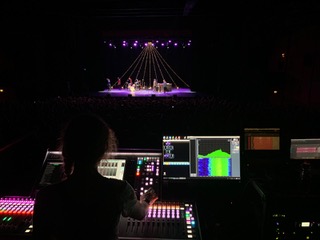 What do you like best about touring?
What do you like best about touring?
I love the escapism, the fact you get to run away with the circus for a living. This can be a double-edged sword as you can run away from anything difficult in your personal life and you can avoid committing to anything at home with the excuse that you will be taking off again soon which has long term implications on your personal life. But the camaraderie and feeling of being part of a team are unbeatable as well as the incredible places you get to travel to and the music and audiences you get to experience whilst being paid for it!
What do you like least?
The lack of job stability, structure or protection, particularly at the outset of your career, can make you feel very vulnerable at times, making you feel like you have to say yes to everything and work all of the time, which is a vicious circle. Sometimes it forces you to compromise or behave in a way that can be detrimental to your values or mental health to keep everyone around you happy because you think that’s how you will keep your job. It can take a long time to be confident enough to say no.
What is your favorite day off activity?
Getting a massage or finding a local yoga or pilates class, then finding a great local restaurant and using the hotel pool and Jacuzzi to reeeeelax
What are your long-term goals?
My current long-term goal is to fit having a family in without completely compromising my career, which I am not ashamed to admit, terrifies me. I feel a great responsibility to the women coming behind me to help normalize the idea that women can be mothers and also have a career in live music.
What if any obstacles or barriers have you faced?
I have had it said to me on more than one occasion over the years that so and so big artists ‘just won’t have a girl’ mixing foh when I have been put forward, but I think this perception issue is dying thankfully. Alas, in my case, because I am a bit older, I certainly feel like my opportunities have been limited compared with some of my male contemporaries
How have you dealt with them?
I have completely ignored it, risen above it, kept going, driving forward, taking on bigger and better projects, being ambitious, and saying YES even when out of my comfort zone. At the same time, I have been vocal about women working in the industry and supportive of organizations like SoundGirls so that women mixing sound is normalised.
The advice you have for women who wish to enter the field?
Be clear about the career path you want to take. By all means, work in a few different roles at the very start, but make a decision about which department you want to work in and stick to it. I hear lots of people trying to multi task-do lights, sound, video, tour management, but I think that is a recipe for long term low end-work rather than high-end specialism and it has held me back working as a TM/FOH. Specialize and stick to your guns, getting as much experience as possible in your chosen field only. By all means, take on merch or something similar to get you on tour in the first place, but once you are getting paid work in your field, stick with that, and push forward. Don’t compromise.
Must have skills?
Tolerance, patience, and the ability to remain calm
Favorite gear?
I am an analog console junky; I love the MIDAS XL4 and Heritage series consoles. My outboard rack contains a BSS901 Dynamic Eq, Empirical Labs Distressor, and Roland SDE3000 delay.
Parting Advice
I guess the most important thing to me at the moment, having done nothing but tour for 20 years is to encourage the younger people coming up behind me to make sure they hold on to work-life balance and be super aware that doing this for a living is a MASSIVE compromise on your life. Despite what it might look like from the outside-especially for women when it comes to relationships and family. It’s so easy to run away with the circus and keep running, but it doesn’t do your mental health any favours later down the line. We are seeing a lot in the press and on social media about mental health these days and having tragically lost so many high profile artists to suicide and drug overdoses in recent years, people in live music circles people are finally beginning to talk and open up about the negatives of what is perceived as a very glamorous. So I think it’s really important that young people are made aware of the negatives, not just the positives, and given the tools to keep a balance. I think we must keep fighting for better conditions and more structured work arrangements as much as is possible.

